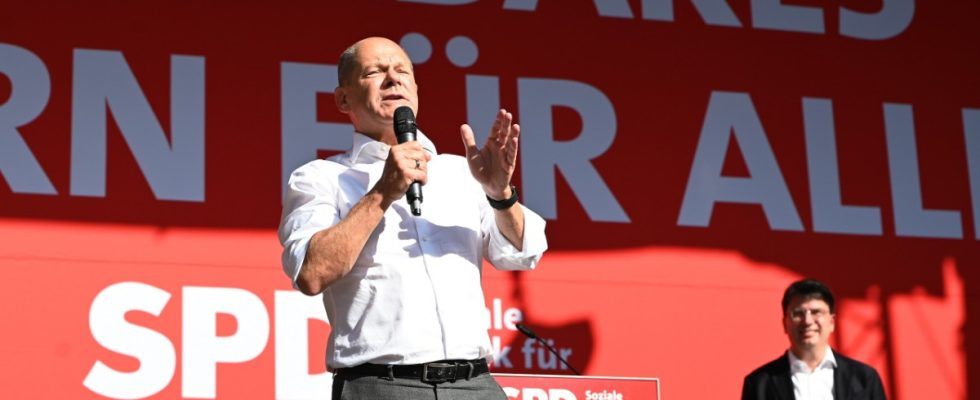Lively and passionate as one rarely sees, Chancellor Olaf Scholz (SPD) launched the state election campaign of his Bavarian party friends on Friday afternoon. At the opening rally in front of around 3,000 visitors on Munich’s Marienplatz, Scholz was not impressed by the demonstrators, who used whistles and shouts to create a permanent background sound that the chancellor, however, could not drown out. The sound engineers at the mixing desk were even able to turn down his initial volume on the microphone. “The headwind was manageable,” said Florian von Brunn, the SPD’s top candidate in the Bavarian state elections on October 8th. He promised: “With the chancellor’s backing, we’ll continue at full throttle.”
Seven weeks before the vote, the Social Democrats are fighting against slipping into the single-digit percentage range in the polls. They are forecast to win between nine and eleven percent, which is far removed from the election targets: 15 percent and participation in the government. The poor poll numbers are blamed within the party on the politics of the federal government led by the SPD; Some political observers had doubted whether the Federal Chancellor was the right man to bring about a change in mood.
In his 26-minute speech, Scholz therefore immediately went on the offensive and defended Germany’s involvement in the Ukraine war, including the arms deliveries. He countered the pacifists on Marienplatz with their doves of peace – “symbols of the 1980s,” as he noted – that they were “fallen angels from hell speaking to a warmonger.” That meant Russian President Vladimir Putin.
Scholz attacked the Bavarian state government somewhat more moderately because of its blockade of the energy transition: “If the large power lines from the north and east to the south and west had already been built, we would have had cheaper electricity prices there.” And referring to the AfD, the Chancellor said: “Right-wing populists are bad for prosperity, they stand for a bleak future.” In Bavaria, however, it is definitely bright. “Bavaria has the best chances of developing well. And Florian von Brunn and the SPD in Bavaria are the right people for this,” the Chancellor campaigned for his comrades in the Free State.
Demonstrators with peace doves could be seen on Marienplatz.
(Photo: Robert Haas)
With blue and yellow flags, some expressed their solidarity with Ukraine.
(Photo: Robert Haas)
Florian von Brunn had previously promoted his party’s plans on the stage set up on Dienerstrasse. The slogan on the screen behind him summed it up in four words: “Affordable Bavaria for everyone.” In addition to affordable housing, Brunn listed free day care centers and inexpensive energy. He also announced investments in care, education, innovation and the transformation of the economy. Like Scholz later, Brunn had also been active: he wanted to “do it instead of just being soder”. Brunn firmly distanced himself from the AfD and its supporters: “These are pure right-wing extremists, they are racists and misanthropes. This is not an alternative, but a shame for Germany.”
Because of the announced counter-demonstrations, the police had already cordoned off the SPD rally area with bars at noon. If you wanted to get in, you had to have your bags checked. Outside the bars, supporters and opponents of the chancellor and his government mingled. The critics were loud but not very numerous. AfD and lateral thinkers had mobilized their supporters, who crowded around the town hall, in the shadow of the row of houses there. There they stood next to people who expressed their solidarity with Ukraine with blue and yellow flags. They applauded as Scholz pledged his support to Ukraine while right-wing counter-protesters roared and whistled. Apart from that, there were no special incidents at Marienplatz, a police spokesman reported.
The AfD’s official protest against the chancellor took place at the Stachus. Party members and supporters stood there and held up placards. Contact with passers-by was limited, as the police delimited the AfD area with bars. Counter-demonstrators stood around the lattice, so that little was to be seen of the AfD stand. Antifa had called for a counter-counter-protest. Between the police and Antifa activists there were scuffles in between, two officers were slightly injured, the police reported. She was on duty around the Scholz performance with a total of 300 officers.

